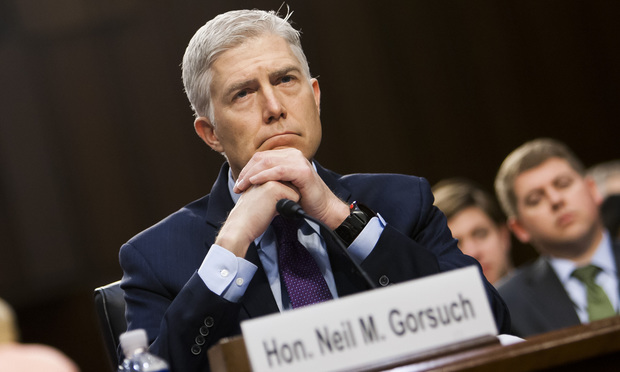Gorsuch, Native American History Meld for Major Tribal Rights Ruling
"We feel really blessed and fortunate that we now have a number of justices on the court who are expressing a great interest in tribal issues," says Riyaz Kanji, who argued on behalf of the Creek Nation at the U.S. Supreme Court in "McGirt v. Oklahoma."
July 15, 2020 at 02:15 PM
6 minute read
The original version of this story was published on National Law Journal
 Judge Neil Gorsuch testifies at his confirmation in 2017. (Photo: Diego M. Radzinschi / ALM)
Judge Neil Gorsuch testifies at his confirmation in 2017. (Photo: Diego M. Radzinschi / ALM)
Indian law practitioner Riyaz Kanji knew early in the litigation that the way to win one of the most important Native American cases to reach the U.S. Supreme Court was to tell the story of the Muscogee Creek Nation. On the very last day of the justices' term, an 1832 promise to the tribe made at "the far end of the Trail of Tears" was honored.
Kanji of Kanji & Katzen in Ann Arbor, Michigan, argued on behalf of the Creek Nation in perhaps the biggest sleeper surprise of the term just ended: the decision in McGirt v. Oklahoma.
A 5-4 majority, led by Justice Neil Gorsuch, agreed with Jimcy McGirt that land reserved for the Creek Nation since the 19th century remains an Indian reservation and Oklahoma thus lacked jurisdiction to prosecute McGirt.
The result was a surprise because the court generally has not been viewed by Indian lawyers as a favorable forum for Indian law claims, and a major litigating strategy has been to keep cases away from the Supreme Court.
The majority opinion meant that nearly half of Oklahoma, 3 million acres, including the city of Tulsa, is a Creek Nation reservation for purposes of federal criminal law, and that prosecution of Indians who commit crimes on the reservation falls under federal, not state, jurisdiction.
Gorsuch's majority opinion was joined by Justices Ruth Bader Ginsburg, Stephen Breyer, Sonia Sotomayor and Elena Kagan.
"On the far end of the Trail of Tears was a promise," Gorsuch wrote. "Forced to leave their ancestral lands in Georgia and Alabama, the Creek Nation received assurances that their new lands in the West would be secure forever."
Dissenting opinions were filed by Chief Justice John Roberts Jr. and Justice Clarence Thomas.
"Across this vast area, the State's ability to prosecute serious crimes will be hobbled and decades of past convictions could well be thrown out," Roberts wrote. "On top of that, the court has profoundly destabilized the governance of eastern Oklahoma."
Kanji argued the legal issue twice in the Supreme Court as an amicus on behalf of the Creek Nation. The case Sharp v. Murphy was heard by the justices in the 2018 term, but the justices were unable to decide the case. They subsequently substituted McGirt for Murphy. Jenner & Block partner Ian Gershengorn represented McGirt. Kanji was assisted in the case by Muscogee Attorney General Roger Wiley and First Assistant Attorney General Kyle Haskins.
Kanji, a former clerk to Justice David Souter, shared with The National Law Journal some thoughts on his experience with the case, which began with Murphy in the U.S. Court of Appeals for the Tenth Circuit.
How important was historical research to the outcome?
Clearly it's a case grounded in history. When we came into the case in the Tenth Circuit, we pretty quickly realized the only way to win the case was to really tell the story of the Creek treaty history, stretching back to the Trail of Tears.
We had not been involved in the trial court, and this wasn't a case with historical experts, so it was important to move the ball quickly. We had lawyers playing the role of amateur historian and researching like crazy and then we brought in historians to help us dig through materials. We were able to draw on the support of lawyers in Indian country—lawyers from Oklahoma. It was really a team effort.
How did this case compare to other Indian law cases you have handled?
In some ways, there were a lot of similarities. A lot of cases involve history and treaty promises. Then, like some of our cases, this one had that feeling from the outset that it was a really important case. Much conventional wisdom was being challenged. I think we had it in our minds from the outset that this was a case that could end up in the Supreme Court. We had to be mindful of that from the get-go.
What did you think of the majority lineup of Gorsuch joined by the court's liberal justices?
We feel really blessed and fortunate that we now have a number of justices on the court who are expressing a great interest in tribal issues and getting to the root of first principles. With respect to Justice Gorsuch, I think four things are in play in his approach: He is a keen student of history, and that extends to tribal history.
As a westerner, he understands that tribes and state and local governments can all cooperate. He is a fervent believer in separation of powers, and he recognizes Congress' primacy in Indian affairs. A lot of what tribes have suffered in the last two decades have been where the court has imposed its own balance. He says the court should get out of that. And, he is a strict textualist, and he is hewing faithfully to the language of treaties and statutes and saying illegal acts over time or claims of dire consequences can't override promises in treaties and statutes.
 Justice Neil Gorsuch (left) and Chief Justice John Roberts Jr. walk down the steps of the U.S. Supreme Court. (Photo: Diego M. Radzinschi/ALM)
Justice Neil Gorsuch (left) and Chief Justice John Roberts Jr. walk down the steps of the U.S. Supreme Court. (Photo: Diego M. Radzinschi/ALM)What about those "dire consequences" that the dissenting justices predicted?
We told the court that the state and the tribes were fully capable of working out any issues at the margins. Oklahoma is a pretty remarkable place in the extent of intergovernmental cooperation. A lot of former state officials were telling the court the same thing. We were really appreciative of the fact the court gave the Nation a chance to speak both with its own voice and in the briefing.
Will this decision change the general reluctance of tribes to go to the Supreme Court?
I think one always wants to be respectful of the court and the awesome powers it has. I think we have a court that is demonstrating a very serious interest in Indian law and first principles, including the importance of vindicating treaty promises. That certainly suggests the opportunity to litigate some very important issues to the court.
Read more:
Tobi Young, First Native American SCOTUS Clerk, Recounts Year With Gorsuch
Justice Gorsuch Would Be 'Grateful' if You'd Answer His Question
Writing Styles of Gorsuch and Kavanaugh Revealed in Arbitration Rulings
From Law Prof to SCOTUS Clerk: Gorsuch Is Hiring From Academia
This content has been archived. It is available through our partners, LexisNexis® and Bloomberg Law.
To view this content, please continue to their sites.
Not a Lexis Subscriber?
Subscribe Now
Not a Bloomberg Law Subscriber?
Subscribe Now
NOT FOR REPRINT
© 2025 ALM Global, LLC, All Rights Reserved. Request academic re-use from www.copyright.com. All other uses, submit a request to [email protected]. For more information visit Asset & Logo Licensing.
You Might Like
View All
After Solving Problems for Presidents, Ron Klain Now Applying Legal Prowess to Helping Airbnb Overturn NYC Ban
7 minute read
DOJ, 10 State AGs File Amended Antitrust Complaint Against RealPage and Big Landlords
4 minute read
Special Counsel Jack Smith Prepares Final Report as Trump Opposes Its Release
4 minute read
Pentagon Settles Suit Seeking to Clear Records of Service Members Discharged for Being LGBTQ
3 minute readLaw Firms Mentioned
Trending Stories
Who Got The Work
Michael G. Bongiorno, Andrew Scott Dulberg and Elizabeth E. Driscoll from Wilmer Cutler Pickering Hale and Dorr have stepped in to represent Symbotic Inc., an A.I.-enabled technology platform that focuses on increasing supply chain efficiency, and other defendants in a pending shareholder derivative lawsuit. The case, filed Oct. 2 in Massachusetts District Court by the Brown Law Firm on behalf of Stephen Austen, accuses certain officers and directors of misleading investors in regard to Symbotic's potential for margin growth by failing to disclose that the company was not equipped to timely deploy its systems or manage expenses through project delays. The case, assigned to U.S. District Judge Nathaniel M. Gorton, is 1:24-cv-12522, Austen v. Cohen et al.
Who Got The Work
Edmund Polubinski and Marie Killmond of Davis Polk & Wardwell have entered appearances for data platform software development company MongoDB and other defendants in a pending shareholder derivative lawsuit. The action, filed Oct. 7 in New York Southern District Court by the Brown Law Firm, accuses the company's directors and/or officers of falsely expressing confidence in the company’s restructuring of its sales incentive plan and downplaying the severity of decreases in its upfront commitments. The case is 1:24-cv-07594, Roy v. Ittycheria et al.
Who Got The Work
Amy O. Bruchs and Kurt F. Ellison of Michael Best & Friedrich have entered appearances for Epic Systems Corp. in a pending employment discrimination lawsuit. The suit was filed Sept. 7 in Wisconsin Western District Court by Levine Eisberner LLC and Siri & Glimstad on behalf of a project manager who claims that he was wrongfully terminated after applying for a religious exemption to the defendant's COVID-19 vaccine mandate. The case, assigned to U.S. Magistrate Judge Anita Marie Boor, is 3:24-cv-00630, Secker, Nathan v. Epic Systems Corporation.
Who Got The Work
David X. Sullivan, Thomas J. Finn and Gregory A. Hall from McCarter & English have entered appearances for Sunrun Installation Services in a pending civil rights lawsuit. The complaint was filed Sept. 4 in Connecticut District Court by attorney Robert M. Berke on behalf of former employee George Edward Steins, who was arrested and charged with employing an unregistered home improvement salesperson. The complaint alleges that had Sunrun informed the Connecticut Department of Consumer Protection that the plaintiff's employment had ended in 2017 and that he no longer held Sunrun's home improvement contractor license, he would not have been hit with charges, which were dismissed in May 2024. The case, assigned to U.S. District Judge Jeffrey A. Meyer, is 3:24-cv-01423, Steins v. Sunrun, Inc. et al.
Who Got The Work
Greenberg Traurig shareholder Joshua L. Raskin has entered an appearance for boohoo.com UK Ltd. in a pending patent infringement lawsuit. The suit, filed Sept. 3 in Texas Eastern District Court by Rozier Hardt McDonough on behalf of Alto Dynamics, asserts five patents related to an online shopping platform. The case, assigned to U.S. District Judge Rodney Gilstrap, is 2:24-cv-00719, Alto Dynamics, LLC v. boohoo.com UK Limited.
Featured Firms
Law Offices of Gary Martin Hays & Associates, P.C.
(470) 294-1674
Law Offices of Mark E. Salomone
(857) 444-6468
Smith & Hassler
(713) 739-1250








